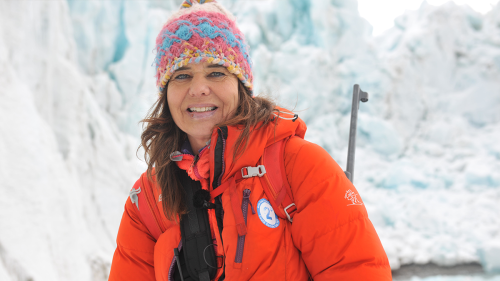The reality of climate change: “We’ve had CEOs become teary-eyed”
30 November 2018
Bernice Notenboom explains why she takes corporate and financial sector leaders to see the impact of global warming.

Bernice Notenboom
is an explorer, documentary maker, and climate journalist. She is one of the only women to ski to the North and South Pole and has led three expeditions to Spitsbergen in Norway’s Svalbard archipelago with CEOs, financiers and entrepreneurs to investigate the consequences of climate change. Her latest book, Arctica, is published in November.
Why is it important for corporate and financial sector leaders to see the impact of climate change themselves?
Travelling to Spitsbergen awakens people senses that are usually dormant. It triggers sensations and emotions that they don’t experience on a day-to-day basis. The landscape is stunningly beautiful and people are moved by it. It results in a much stronger reaction than just talking at a conference and then again having a nice dinner at a five star hotel. By seeing what is at stake for our planet, people react from the head to the heart. And that is the only way we will jump into action for our planet.
Why isn’t scientific evidence enough to get people to act on climate change?
Science is important. On our expeditions we deliver hard science and powerful evidence that explains the challenges facing the world. For example, we have a scientist from the European Space Agency who brings compelling satellite data. But it is all the more powerful because we are able to show that the seemingly peaceful landscape is changing dramatically: sea ice in fjords is retreating and fresh water is entering the ocean and warming it up. It brings home the reality of climate change when you can actually see how a glacier has moved in the past 10 years ago.
What reaction do people have?
The realisation of the effect human beings are having on the world makes some people emotional: we’ve had CEOs break down and become teary-eyed. Everyone is torn between seeing the beauty of the landscape and wanting to save it and recognising the huge scale of the challenges the world faces and the simple fact that the easy way out is to do nothing and enjoy what we have.
Other than demonstrating the reality of climate change, what do you hope to achieve?
Our objective is to compel people to think and then hopefully to act. In this sense we are lucky because of the isolation of Spitsbergen. CEOs have time together, with no secretary pestering them with appointments or even Wi-Fi to respond to emails. They enjoy talking to each other and reflecting on the world in a way that simply isn’t possible in the day-to-day lives.
We are not seeking to reinvent the wheel but these discussions can deliver impressive results. They help people to reach out and forge new alliances. For example, the Dutch national rail provider and a trash company have helped to create a circular economy-based model to deconstruct and refurbish trains. A port operator and airport, which might usually be seen as competitors, were brought together on our expedition and decided to bulk buy green energy using their collective scale to secure lower prices.
How was your expedition to Spitsbergen with people from the finance sector different to the CEO expedition?
Bringing together people from the world of finance was much harder than getting CEOs involved. Finance is more conservative and resistant to change – to be honest it was like going to the dentist. ING believed in what I was doing – it has been on all three expeditions – and its involvement helped to encourage other banks to come along, which then encouraged insurers, investors and so on. Because my expeditions receive media attention, the finance industry began to worry about reputational damage and we started to gain traction.
What should the financial sector be doing to address climate change?
It is essential that the finance world works collectively. Before the expedition we had a number of sessions to understand what our goals might be. They coincided with the drafting of a climate law in the Netherlands to implement the 2° goal.
Bizarrely, banks were not part of the process and we decided to come up with a plan that we could then present to the people drafting the law. It outlined the need to establish ways to measure and report the CO2 implications of investment and lending decisions. It committed all expedition participants – and a number of financial institutions that did not come on the expedition – to a target of a 49% CO2 reduction by 2030 in line with the Paris accord.
Obviously most people can’t travel to Spitsbergen to understand the impact of humanity on the world. How can we change their behaviour?
Frankly, the global situation is not good. In India, for example, 500 million people still use wood to cook each day, which is devastating for the environment. And in the US, the entire economy is structured around debt and consumption. Finding ways to change people’s habits and reorganise societies will be extremely difficult. In all honesty, the world may have heated by 4° before any serious action gets underway. But that is not a reason for those of us who can see the potential threats to begin to act now.
What should we be doing as individuals?
Changing individual behaviour is tough, especially among older people – millennials are more open to new ideas. Our brains aren’t wired to give up privileges that we believe we’ve earned. Climate change doesn’t smell, and is largely invisible. It’s not like a meteor that will hit us in 36 hours. Most human beings act in a disappointing way when confronted with such an intangible challenge.
The health of the planet should be the number one issue everywhere around the world. It’s real and severe and there are plenty of signs and evidence if we care to look. On an individual level, we need to buy the right products, vote the right way, and make whatever lifestyle changes we can. The impact of these actions may be a drop in the ocean, however. Ultimately, we need a change in the system and that will only come from companies and governments.
This interview is published in ING's online magazine The View. Visit the latest View for more.


